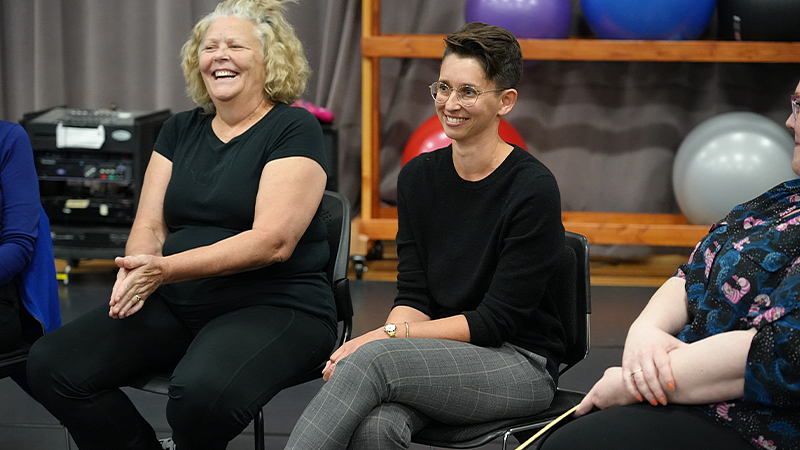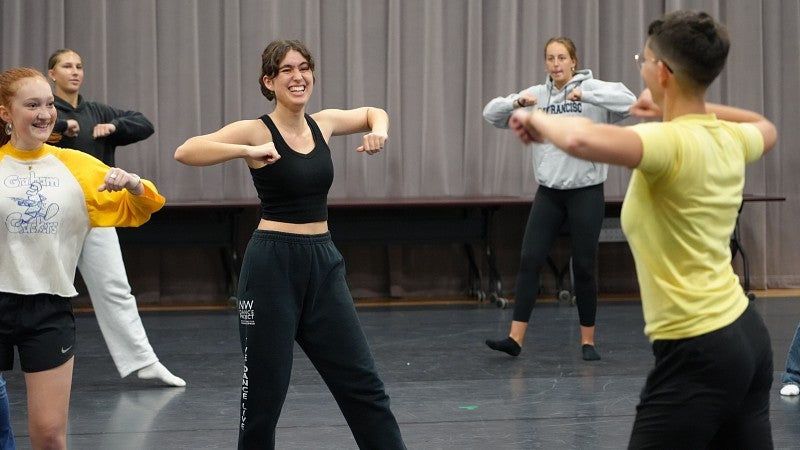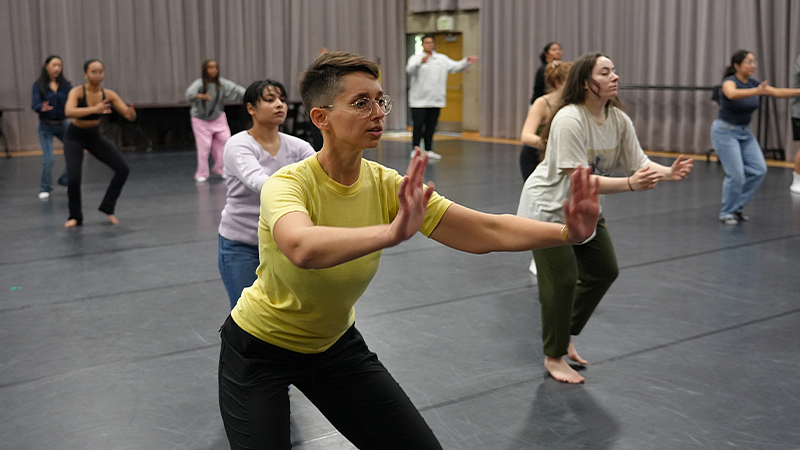
Dr. Amy Swanson introduces herself to fellow faculty members and students at Orientation, Fall 2024
Dr. Amy Swanson joins the University of Oregon School of Music and Dance (SOMD) as an assistant professor of dance studies, theory, and history.
Her research focuses on contemporary dance and performance in Senegal and her teaching spans dance studies, dance practice, and African studies. Her writing has appeared in Dance Research Journal, Conversations Across the Field of Dance Studies, African Studies Review, and Critical African Studies.
She is the recipient of a National Endowment for the Humanities Summer Stipend and a Fulbright-Hays Doctoral Dissertation Fellowship.
She previously held a position as Assistant Professor of Dance at Colgate University and she also taught at Northwestern University, where she received her M.A. and Ph.D. She serves on the Board of Directors of the Dance Studies Association as Vice President of Conferences.
Q: What does dance mean to you?
A: I can’t imagine my life without dance. I grew up a very shy child, and I hated talking but dance was a way to express myself without words. I think, for me, that’s something I’ve always held on to.
Dance is an embodied language and because it’s the body and not words and speech, there are other layers and meanings that can unfold in a piece of choreography or in an improvised social dance. There are so many ways to communicate and express through the body. That’s the most exciting thing about it.
Q: What will you teach at SOMD?

Dr. Swanson leads African Dance Aesthetics
A: African Dance Aesthetics in Fall 2024 and Dance and Power, Contemporary Issues in Dance, and Looking at Dance in upcoming terms.
I’m here to help shape the dance studies curriculum and design those upper-level courses. African Dance Aesthetics will encompass both theory and practice. Dance and Power and Contemporary Issues cover the broader political, economic, and sociocultural contexts in which dance forms are embedded.
What I’m excited to bring to the dance department is that academic lens, and offering different methodologies for how to think about dance, how to talk about dance, and how to create dance with an academic background.
Q: What are you looking forward to most?
A: I spent the last several years teaching in a theatre department, which was great in some ways, but I really missed having people who came to that institution to study dance.
The Dance Department at UO feels really robust. It feels like there are a lot of possibilities. The students I have met have really made me excited about getting to know them and instructing them so I’m excited to get into the classroom and start teaching.

Q: What is your teaching philosophy?
A: My teaching philosophy is always under revision. It’s not something that is fixed. I’m always reflecting and rethinking courses I’ve taught — thinking about what needs to evolve and what can I change.
One of the central things that motivates my courses is understanding that dance is not just something to perform, watch, or consume. There is so much happening underneath it — thinking about how dance is implicated in broad sociocultural, political, and economical contexts. How do we make those connections between what we see on stage and all these other layers that we see underneath?
Q: What does your research focus on?
A: My research focuses on contemporary African dance. I’ve been traveling to Senegal for 14 years now. When I first arrived in the country, I was young and naive. Up until that point, what I had learned as a dance student, spectator, and performer was that dance forms in the global south are "traditional” or “folkloric.”
The idea of contemporary dance is always tied to the White Western world, so going there and stumbling upon contemporary dancers who were doing fascinating, rich, and sophisticated work broke up those previously held beliefs. That motivated me to stay and continue studying contemporary dance there and eventually to pursue a PhD.
My first project that came out of my doctoral dissertation is about the transnational circulation of contemporary dance artists who live in Senegal. How are they contending with the fact that they live in an economically marginalized location, and to perform and circulate, they have no choice but to tour and perform in Western Europe?
Swanson performs in Dakar, Senegal, 2023
My forthcoming book, also as a part of this project, expands upon my dissertation and focuses on contemporary dance artists who are incorporating queer aesthetics in their work in subtle or ambiguous ways. Right now, Senegal has a homophobic culture and climate, but in part because these artists have access to the transnational circuit, they’re able to create works that push back on that context in Senegal.
University of Michigan Press is set to publish Dr. Swanson’s book, titled “Dancing Opacity: Contemporary Dance, Transnationalism, and Queer Possibility in Senegal” in fall 2025.
